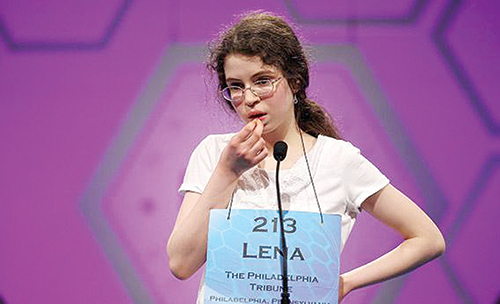
Every year, as Memorial Day passes and the last days of May move us closer to summer, I find myself reminiscing about the zenith of my athletic career. Sixteen years ago, a single misstep prevented me from earning national face time on ESPN as my adolescent dreams crumbled under the sobering weight of premature defeat.
All it took was the wrong vowel, a less-than-confident “I” uttered where there should have been an “E,” and any hope I had of appearing on the Worldwide Leader in Sports faded as I stepped away from the microphone for the last time.
Say what you will about the merits of classifying spelling as a sport, but there is no doubt that the middle-school students congregating in Maryland this week for the 86th edition of the Scripps National Spelling Bee are competitors. With the dictionary as their playbook, etymology their offense and linguistics their defense, they are like any other athletes who have spent untold hours training for their moment of truth.
That moment of truth begins today, and by Thursday evening all but one of the 281 boys and girls in the contest will hear the same bell that forced me off the dais in 1996 and 1997. But whether they are eliminated in preliminaries or the championship round, each speller will confront more hurdles on their quest than any previous contestant has endured. This year, in addition to spelling the words, they will also have to be able to provide definitions.
Scripps announced earlier this spring that one section of the preliminary computer exam would be devoted to a series of vocabulary questions. The organizers’ stated goal was to expand the range of skills required to claim the championship, and even though this new twist should not cause the brightest of the contenders to stumble, the very basis of the contest is altered by this addition to the early rounds. Now spellers must not only execute the plays in the playbook, but also explain the meaning behind each play. Knowledge of phonemes and root words should allow the best entrants to dispatch with the vocabulary section without too much difficulty, but these skills were meant to accomplish a specific goal—spelling. Scripps has essentially added a secondary competition that is only peripherally relevant while having an outsized effect on the outcome.
Elite athletes have a limited shelf life; 25-year-olds in the prime of their athletic ability are destined to endure years of diminishing returns on their talent, only able to show glimpses of that past brilliance once they are past their physical peak. This is a simple reality of human physiology that extends to all sports, whether predicated on endurance or agility or raw strength or even intellectual ability.
But even though the youngsters who make it to the Scripps National Spelling Bee will be capable of spelling for decades to come, their eligibility is capped. Once they reach 15 or enter the ninth grade, spellers must find new outlets for their intellectual and competitive instincts. And for the adolescent who emerges as the champion, there is no chance for a title defense—only instant retirement.
With just a few opportunities to spell their way to the top, the kids who advance to the World Cup of their pastime should be tested on their ability to construct words, not explicate them. As I watch the competition on the ESPN family of networks this week, I’ll be thankful that I was competing when the rules were simpler, and I’ll wonder whether a different champion might have emerged without this wrench in the system.

